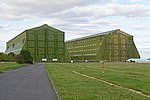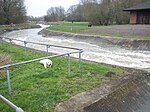Cardington, Bedfordshire

Cardington is a village and civil parish in the Borough of Bedford in Bedfordshire, England. Part of the ancient hundred of Wixamtree, the settlement is best known in connection with the Cardington airship works founded by Short Brothers during World War I, which later became an RAF training station. However most of the former RAF station is actually in the parish of Eastcotts, as is the settlement of Shortstown, which was originally built by Short Brothers for its workers. The village of Cardington is located to the north east of Shortstown and the RAF station, and houses most of the population of the parish, which was 270 in 2005, making it one of the least populated parishes in Bedfordshire.
Excerpt from the Wikipedia article Cardington, Bedfordshire (License: CC BY-SA 3.0, Authors, Images).Cardington, Bedfordshire
Southill Road,
Geographical coordinates (GPS) Address Nearby Places Show on map
Geographical coordinates (GPS)
| Latitude | Longitude |
|---|---|
| N 52.1161 ° | E -0.4139 ° |
Address
Southill Road
Southill Road
MK44 3TF
England, United Kingdom
Open on Google Maps







